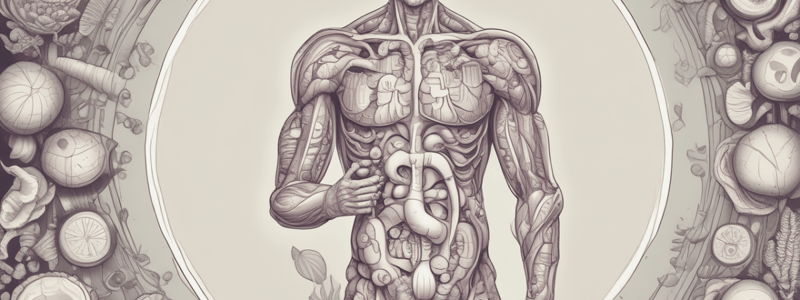Podcast
Questions and Answers
What is a recommended daily intake of magnesium for men?
What is a recommended daily intake of magnesium for men?
- 400-420 mg/day (correct)
- 320-330 mg/day
- 310-320 mg/day
- 450-460 mg/day
What is a common source of magnesium?
What is a common source of magnesium?
- Dairy products only
- Plant foods such as spinach and green leafy vegetables (correct)
- Meats
- Fruits
What is a potential consequence of chronic magnesium deficiency?
What is a potential consequence of chronic magnesium deficiency?
- Abnormal heartbeat rhythm
- Stronger muscles
- Increased energy levels
- Increased risk of osteoporosis (correct)
Which of the following increases urinary excretion of magnesium?
Which of the following increases urinary excretion of magnesium?
What is a mild symptom of magnesium deficiency?
What is a mild symptom of magnesium deficiency?
Why is magnesium toxicity rare from eating too much magnesium-rich food?
Why is magnesium toxicity rare from eating too much magnesium-rich food?
Why are older adults more susceptible to magnesium deficiency?
Why are older adults more susceptible to magnesium deficiency?
What is a limitation of multivitamin/mineral supplements in terms of magnesium?
What is a limitation of multivitamin/mineral supplements in terms of magnesium?
Flashcards are hidden until you start studying
Study Notes
Prevention of Magnesium Deficiency
- Eat a variety of magnesium-rich foods such as spinach, green leafy vegetables, whole grains, beans, nuts, seeds, and chocolate to prevent magnesium deficiency.
- Consume recommended daily amounts of magnesium: 310-320 mg/day for women and 400-420 mg/day for men.
- Limit or avoid factors that increase urinary excretion of magnesium, including excessive alcohol consumption, poorly controlled diabetes, and certain medications (diuretics).
- Older adults should prioritize magnesium intake as their bodies absorb less of the mineral and urinary losses increase with age.
Consequences of Magnesium Deficiency
- Mild magnesium deficiency can cause tiredness, weakness, loss of appetite, nausea, and vomiting.
- Severe magnesium deficiency can lead to abnormal heartbeat rhythm, muscle cramps, personality changes, and seizures.
- Chronic magnesium deficiency may increase the risk of osteoporosis.
Sources of Magnesium
- Plant foods such as spinach, green leafy vegetables, whole grains, beans, nuts, seeds, and chocolate are the richest sources of magnesium.
- Animal products, like milk and meats, also supply some magnesium.
- Tap water, particularly "hard" tap water, and dietary supplements can also contribute to meeting a person's magnesium needs.
Magnesium Toxicity
- Magnesium toxicity is rare from consuming magnesium-rich foods.
- Toxicity is more likely to occur from ingesting excessive magnesium from laxatives, antacids, and dietary supplements.
- The body has poor absorption of magnesium oxide, a common form found in multivitamin/mineral supplements.
Studying That Suits You
Use AI to generate personalized quizzes and flashcards to suit your learning preferences.




